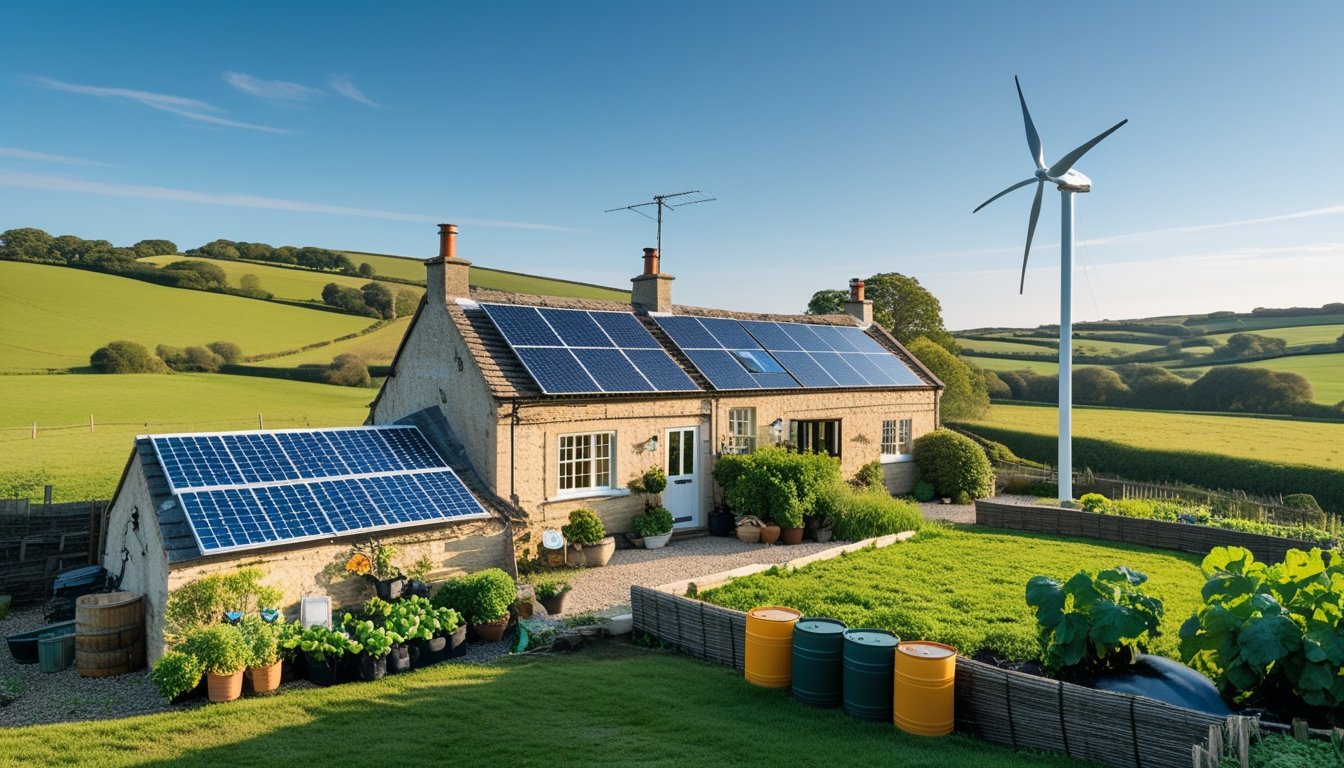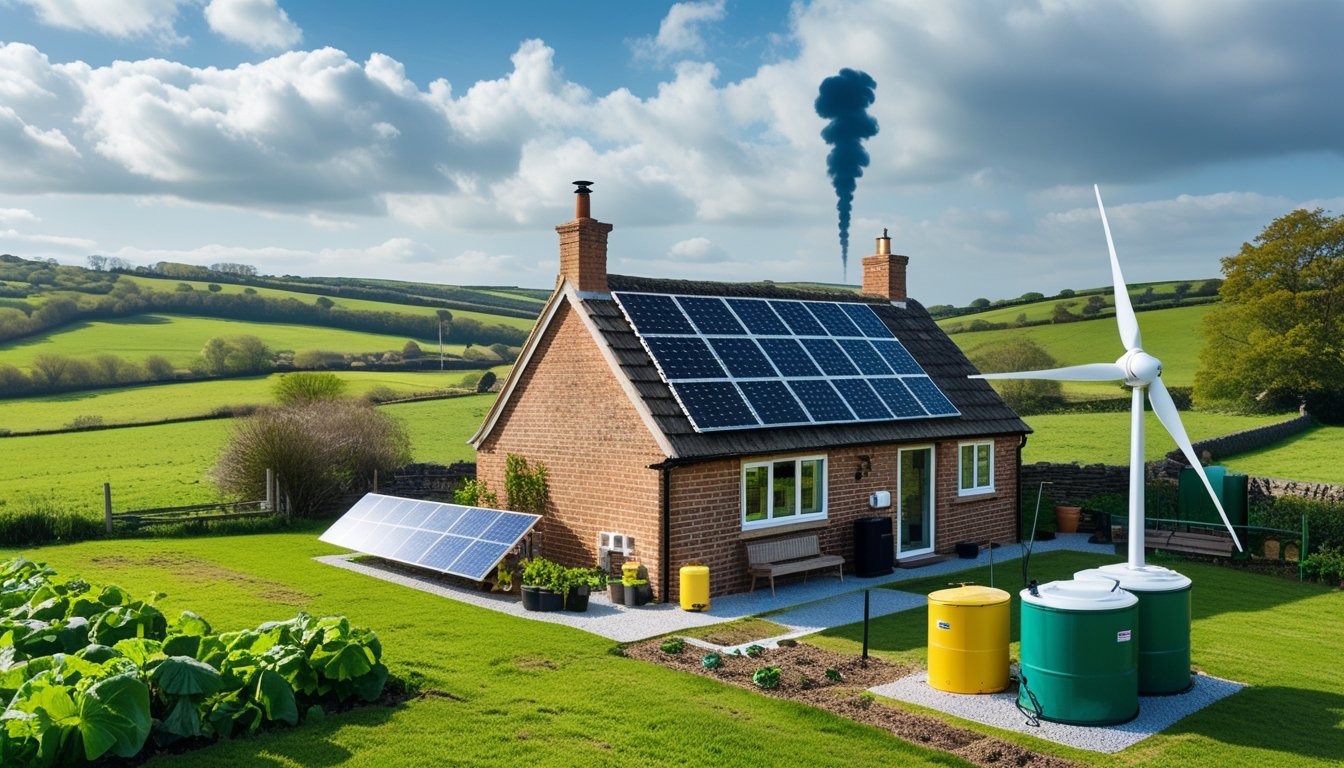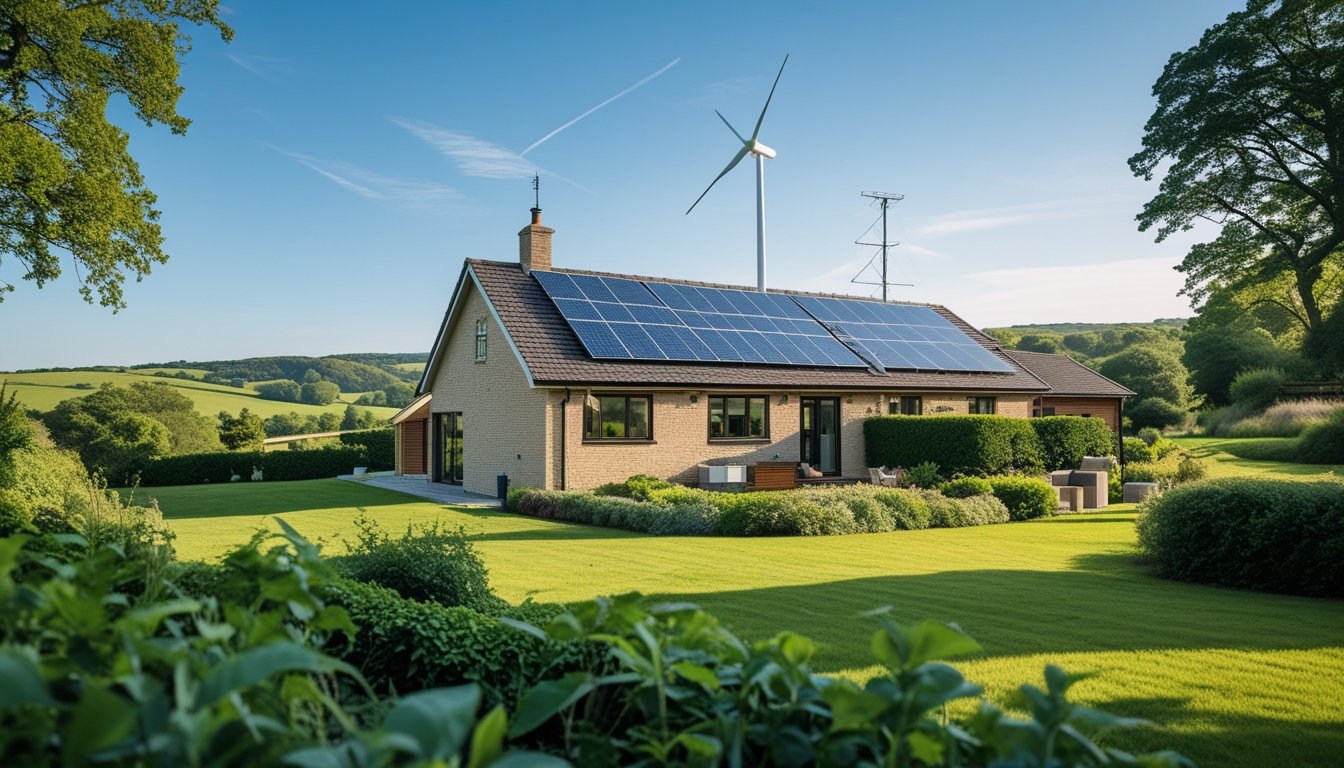Late updated: 07 Aug 2025 16:08
Written by: Eleanor Hartman
Off-Grid Renewable Energy Ideas For Rural UK Homes: Sustainable Solutions for Independence
Living in a rural area offers a unique opportunity to embrace energy independence through off-grid renewable solutions. Harnessing the power of renewable energy not only helps cut costs but also reduces our carbon footprint, making it a smart choice for isolated homes. With an array of options available, there are viable paths forward for those ready to take the step toward sustainable living.

Solar panels, wind turbines, and biomass heaters are some of the popular technologies transforming rural homes in the UK. Each offers distinct advantages, whether it's capturing the sun's energy, utilising the wind's force, or making use of available organic materials for heat. Integrating these systems can significantly lower energy bills and provide a reliable energy source independent of traditional grid connections.
Some rural locations may require more inventive solutions due to unique challenges. For instance, combining multiple renewable systems can offer a balanced and efficient energy mix tailored to the specific needs of a property. Our exploration of these ideas reveals a promising landscape for sustainable rural living.
Key Takeaways
- Off-grid energy offers independence and cost savings.
- Solar, wind, and biomass are key renewable options.
- Combining systems can optimise energy efficiency.
Essential Off-Grid Renewable Energy Solutions for Rural UK Homes
Adopting off-grid renewable energy in rural UK homes is both a practical and sustainable choice. Diverse technologies such as solar panels, wind turbines, and battery storage systems enable us to harness natural resources effectively. By integrating these solutions, we can achieve a reliable and independent energy supply for our off-grid homes.
Solar Power and Photovoltaic Panels
Solar power serves as a cornerstone of off-grid renewable energy. Photovoltaic panels convert sunlight directly into electricity, providing clean and efficient energy. For rural homes, installing solar panels on rooftops or land ensures consistent electricity generation, especially during sunny months.
We must consider the orientation and tilt of solar panels to maximise exposure to sunlight. A south-facing position is ideal for capturing the maximum amount of solar energy. However, solar panels can still function in less-than-ideal conditions, continuing to generate power.
A key benefit is the reduction in electricity bills over time. Solar energy systems are low-maintenance, requiring periodic cleaning and checks. By combining solar power with other renewable sources, we enhance reliability and reduce dependence on traditional power systems.
Wind Turbines and Wind Power Generation
Wind turbines offer another compelling renewable energy source for rural dwellings. These devices harness wind power, converting kinetic energy into electricity. For many off-grid homes, especially those in windy areas, wind turbines can significantly contribute to energy independence.
We must assess wind speed and availability when considering wind turbines. Sites with consistent and strong winds provide the best conditions for efficient power generation. Small-scale turbines are suitable for most rural settings, and when combined with solar panels, they provide a balanced energy supply.
Installing wind turbines involves initial costs, but they deliver long-term benefits. Regular maintenance ensures optimal performance. In volatile weather, wind turbines can provide energy when solar panel output is low, ensuring a stable supply.
Battery Storage and Backup Systems
Battery storage plays a crucial role in any off-grid power solution. These systems store excess energy generated from renewable sources like solar and wind, making it available when the supply from these sources is low. This ensures a continuous power supply irrespective of weather conditions.
We need to consider the battery capacity based on our typical energy usage. Efficient inverter systems convert stored energy into a usable form for household appliances. It is vital to choose batteries with sufficient capacity and lifespan to match our needs.
In addition to renewable sources, diesel generators can serve as backup power during extended low-generation periods. Even though they use fossil fuels, they provide an extra layer of reliability. By using a combination of battery storage and backup systems, we maintain a consistent and sustainable energy supply without reliance on the national grid.
Advanced and Alternative Off-Grid Energy Ideas for Rural Properties

Exploring advanced and alternative energy sources for off-grid living offers a range of opportunities for reducing reliance on traditional power grids. Innovative solutions like biomass energy, geothermal options, and efficient heat pumps cater specifically to the needs of rural dwellers.
Biomass Boilers and Wood Stoves
Biomass boilers and wood stoves employ organic materials such as wood pellets or agricultural waste to produce heat. Biomass energy is sustainable and carbon-neutral, making it an attractive option for those committed to environmental responsibility.
Wood stoves provide direct heat and are suitable for smaller spaces, while biomass boilers connect to a central heating system, offering comprehensive warmth. Installation involves careful planning, including secure storage for fuel. Embracing this technology helps us manage both energy costs and ecological impact effectively.
Heat Pumps: Ground and Air Source
Heat pumps are a sophisticated solution to heating and cooling. Both ground source heat pumps (GSHPs) and air source heat pumps (ASHPs) transfer heat—GSHPs from the earth and ASHPs from the air. These pumps provide efficient home heating and cooling across various climates.
Installing a heat pump requires an initial investment, but the long-term energy savings can be significant. ASHPs are easier to install due to their above-ground placement, while GSHPs require more land for underground pipes. Heat pumps not only lower energy consumption but also contribute to a reduced carbon footprint.
Micro-Hydro and Geothermal Options
Micro-hydro systems utilise flowing water on a smaller scale to generate electricity, making them ideal for properties near rivers or streams. Geothermal energy, on the other hand, taps into the earth's natural heat, offering a consistent power source without reliance on weather conditions.
For micro-hydro, we need to survey water flow and seasonal changes to ensure viability. Geothermal systems generally require professional installation, with considerations for ground temperature variations. Pursuing these alternative solutions allows rural properties to achieve genuine energy independence while respecting the natural environment.
Frequently Asked Questions

In exploring off-grid renewable energy for rural UK homes, we address the most efficient systems available, legal considerations, the initial steps to transition, land requirements, maintenance costs, and community resources. These areas provide a solid introduction to becoming energy independent in rural locations.
What are the most efficient off-grid renewable energy systems for rural homes in the UK?
Solar panels, wind turbines, and hydropower are highly recommended for rural settings. Solar is especially popular due to its affordability and accessibility. Homes with sufficient space can complement solar panels with wind turbines or small-scale hydro systems to maximise energy output.
How can one legally set up an off-grid home in the UK's rural areas?
Before setting up, you need to consider planning permissions and building regulations. It is essential to consult local authorities early in the process to ensure compliance. Renewable energy systems may also require specific permits, so it is advisable to familiarise yourself with these regulations.
What are the initial steps for transitioning to an off-grid lifestyle in the UK countryside?
Identifying a suitable property with the potential for renewable energy installations is a key first step. Assessing energy needs, securing appropriate technologies, and planning sustainable water and waste management systems are essential. Proper research and planning make the transition smoother and more efficient.
How much land is typically required to establish a self-sufficient, off-grid rural home in the UK?
The land requirement varies depending on the energy systems employed and self-sufficiency goals. Generally, a few acres might be needed, especially if incorporating wind turbines or expansive solar setups. Land use for food production or water collection can influence the total size needed for self-sufficiency.
What are the ongoing costs associated with maintaining an off-grid renewable energy system in rural UK?
Maintenance costs include upkeep of solar panels, wind turbines, and battery storage systems. While renewable energy systems have low operational costs compared to traditional energy sources, routine maintenance ensures efficiency and longevity. It's important to budget for occasional repairs and replacements as part of ongoing expenses.
What resources are available for individuals seeking to join off-grid communities in the United Kingdom?
There are several organisations and online forums dedicated to off-grid living. These platforms provide valuable advice and community support. Additionally, attending workshops and networking events can connect you with experienced off-grid enthusiasts and potential community members in the UK.